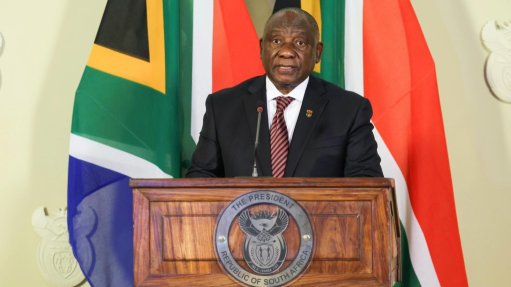Fading voices on sanctions?
This year’s iteration of the UN General Assembly (UNGA) has come and gone. What stood out was the noticeable absence of the familiar spiel from African leaders railing about how the “economic sanctions” imposed by the evil West on Zimbabwe are hurting the people of that country and impacting on neighbouring nations.
The pontification reached a crescendo at the 2022 gathering, with former Senegalese President Macky Sall – the rotational chair of the African Union at the time – joined by the leaders of the Democratic Republic of Congo (DRC) and Kenya in condemning the sanctions as a “crime against the innocent people of Zimbabwe”. Former South African International Relations and Cooperation Minister Naledi Pandor added her voice to the chorus when she addressed the assembly on behalf of President Cyril Ramaphosa, declaring that the “unilateral, coercive measures . . . have compounded the problems experienced by the people of Zimbabwe”.
Earlier that year, Ramaphopsa himself had repeated that mantra during a meeting with US President Joe Biden, as he – like other African leaders, especially from the southern part of the continent – had done in various other public forums. When he attended the UNGA in 2023, Ramaphosa made it a point to berate the nations that imposed sanctions on Zimbabwe.
But the issue of the Western sanctions was little more than a footnote at this year’s event, with the only mention coming from Zimbabwe’s Foreign Affairs Minister, whose President, Emmerson Mnangagwa, was a no-show, seemingly having lost his remarkable wanderlust.
Listening to our leaders defending the authorities in Harare – who by many accounts haven’t scored highly in terms of governance and have often been accused of brutalising ordinary citizens to cling to power – one can’t help but feel a compelling urge to gather them all in a room and give them a crash course in modern Zimbabwean history. It’s essential they grasp that the country’s challenges have little to do with the sanctions, which are actually targeted measures designed to nudge Mnangagwa and his cohorts in government and the military towards respecting human rights and adhering to democratic norms.
Post-independence Zimbabwe didn’t have Western sanctions imposed until 2001, when the late Robert Mugabe, faced with the prospect of electoral defeat by the upstart Movement for Democratic Change, seized white-owned farms, hoping to appease an increasingly restless electorate.
But Zimbabwe’s descent into economic turmoil started earlier – before there were sanctions. In 1997, when veterans of the country’s 1970s independence war arm-twisted Mugabe into granting a Z$50 000 gratuity to each of their 50 000 members, the currency’s exchange rate to the US dollar plunged from 1:4 to 1:20 overnight.
More trouble followed a year later when a third of Zimbabwe’s army of 33 000 was deployed to the DRC to fight off a daring insurgency reportedly backed by Rwanda and Uganda. The cost of that misadventure to the Zimbabwean treasury was staggering, with local and international media reporting in February 2000 – 18 months after the initial deployment – that Z$6-billion in unbudgeted funds had been spent.
Clearly, it is financial mismanagement, and not the sanctions – which bar the targeted individuals from visiting Western countries and prohibit business dealings with specific State entities, such as the arms parastatal – that is the main cause of Zimbabwe’s woes.
It’s about time African leaders became honest with Mnangagwa – and other authoritarian leaders, for that matter. There are precedents of this in our Southern African neck of the woods. When, in late 1979, Mugabe threatened to walk out of the negotiations in London for Zimbabwe’s independence because the deal fell far short of his expectations, Mozambique’s Samora Machel told him in no uncertain terms that, if he chose to continue the war, Mozambique would no longer host Zanu-PF’s training camps. The result? The war ended that very month.
Additionally, the late Levy Mwanawasa in Zambia and Ian Khama in Botswana never shied away from calling out Mugabe for his dictatorial tendencies.
By seeing and hearing no evil in Zimbabwe, our leaders are perpetuating the situation there. Its citizens will continue to move to neighboring countries, worsening tensions with locals.
Article Enquiry
Email Article
Save Article
Feedback
To advertise email advertising@creamermedia.co.za or click here
Announcements
What's On
Subscribe to improve your user experience...
Option 1 (equivalent of R125 a month):
Receive a weekly copy of Creamer Media's Engineering News & Mining Weekly magazine
(print copy for those in South Africa and e-magazine for those outside of South Africa)
Receive daily email newsletters
Access to full search results
Access archive of magazine back copies
Access to Projects in Progress
Access to ONE Research Report of your choice in PDF format
Option 2 (equivalent of R375 a month):
All benefits from Option 1
PLUS
Access to Creamer Media's Research Channel Africa for ALL Research Reports, in PDF format, on various industrial and mining sectors
including Electricity; Water; Energy Transition; Hydrogen; Roads, Rail and Ports; Coal; Gold; Platinum; Battery Metals; etc.
Already a subscriber?
Forgotten your password?
Receive weekly copy of Creamer Media's Engineering News & Mining Weekly magazine (print copy for those in South Africa and e-magazine for those outside of South Africa)
➕
Recieve daily email newsletters
➕
Access to full search results
➕
Access archive of magazine back copies
➕
Access to Projects in Progress
➕
Access to ONE Research Report of your choice in PDF format
RESEARCH CHANNEL AFRICA
R4500 (equivalent of R375 a month)
SUBSCRIBEAll benefits from Option 1
➕
Access to Creamer Media's Research Channel Africa for ALL Research Reports on various industrial and mining sectors, in PDF format, including on:
Electricity
➕
Water
➕
Energy Transition
➕
Hydrogen
➕
Roads, Rail and Ports
➕
Coal
➕
Gold
➕
Platinum
➕
Battery Metals
➕
etc.
Receive all benefits from Option 1 or Option 2 delivered to numerous people at your company
➕
Multiple User names and Passwords for simultaneous log-ins
➕
Intranet integration access to all in your organisation

















